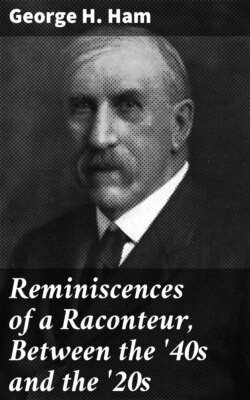Читать книгу Reminiscences of a Raconteur, Between the '40s and the '20s - George H. Ham - Страница 23
На сайте Литреса книга снята с продажи.
I Strike Winnipeg
ОглавлениеTable of Contents
When I struck Winnipeg, the embryo city was just putting on its first pants. The route from eastern Canada was made in summer by the Great Lakes to Duluth or by rail through Minnesota to Fargo or Moorhead—just across the river from each other—the one being in Minnesota and the other in Dakota; and then by boat to the future western metropolis. I went up the Great Lakes to Thunder Bay, walked across the ice and rowed up the Kaministiquia River to Fort William on May 24th, 1875. Then I drove over to Port Arthur, where at Julius Sommer’s tavern, I sat down to a table covered with a checkered red and white table cloth for the first time in my life. The food was good enough—what there was of it—and plenty of it such as it was. After a short stay, I took the steamer for Duluth and the Northern Pacific to Moorhead. My seat-mate on the train from Duluth to Moorhead was Billy Bell—now Col. William G. Bell, a prominent citizen of Winnipeg. There were no sleeping cars then. At Aitken, Minnesota, a lumbering centre, one of those wild-eyed lumber-jacks with his red shirt sleeves rolled up and his trousers stuck in his top boots, leaped on the car, and, furiously brandishing a revolver, swaggered down the aisle.
“Who am I?” was his constant cry to the half-scared occupants of the coach. “Say, who am I? blankety, blankety, blank my blankety blank eyes, who am I?”
As he approached our seat, his voice became if possible a little louder and the revolver was flourished a little more frantically. It peeved me. So I grabbed Billy by the arm, and looking the disturber in the eye, sharply remarked:
“Billy, tell the gentleman who he is!”
That’s all there is to the story, for the bully subsided and vamoosed by the rear door amidst the sighs of relief and hearty laughter of the passengers.
The boat trip from Moorhead to Winnipeg occupied a couple of days and nights. There was keen competition between the old Kittson Line and the Merchants Line. I was a passenger on the International, which left first for the north. The Manitoba passed us some distance down the river, reached Winnipeg, and on its return south-bound trip was at Lemay’s Point, about five miles from Winnipeg, during the night. In rounding the bend, the International, doubtless not unintentionally, made a straight run for her, struck her under the guards, and she partially sank. I was unceremoniously thrown out of my berth, and rushed to the cabin, which was the scene of wild confusion and uproar. One scared fellow-passenger loudly shouted that the boat was sinking, and just then the mate came along, and, hitting him a wallop on the ear, which knocked him down, said: “You’re a dom liar. It’s the other boat that’s sinking.”
